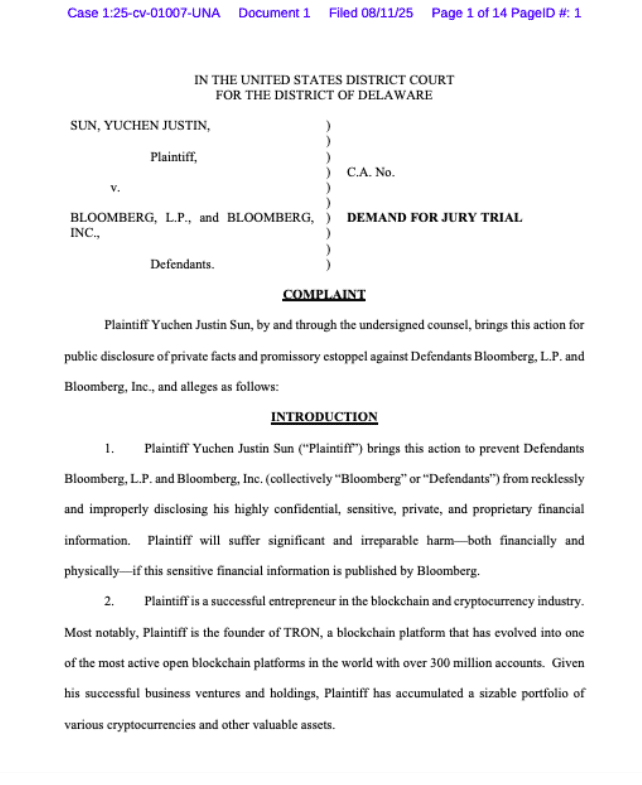According to latest reports, Justin Sun is suing Bloomberg in a US federal court in Delaware. He claims they breached confidentiality agreements by planning to publish a detailed breakdown of his crypto holdings instead of a lump sum estimate as promised. Sun says such disclosure not only violates his trust but may put him at risk, financially and physically.
- Lawsuit to Protect Sensitive Crypto Data
- Confidentiality Promises in Writing and Encrypted Channels
- Risk of Wallet Exposure and Personal Attacks
- Implications for Media and Crypto Visibility
- Conclusion
- FAQs
- What’s Sun’s main complaint against Bloomberg?
- Why is granular crypto data a security risk?
- What legal grounds is Sun citing?
- Has Bloomberg responded?
- Glossary
Lawsuit to Protect Sensitive Crypto Data
According to reports from sources, Justin Sun’s lawsuit states he provided Bloomberg with wallet and token-level data under the condition it would remain confidential, used only for net worth verification for the Bloomberg Billionaires Index. He says his crypto data was to be shown as an aggregate only.

Bloomberg allegedly broke that trust by preparing a draft profile with granular details of his holdings. Sun says this not only breaches their agreement but also puts him and his family in danger by allowing bad actors to trace and target his assets.
Confidentiality Promises in Writing and Encrypted Channels
Sun’s team says they received written and verbal confirmation from Bloomberg personnel that their data would be “strictly confidential”, be deleted after verification and used only for the listed purpose. The promises even included logistical details: secure channels, limited staff such as Bloomberg’s wealth verification team and engineers and for internal use only.
Sun’s complaint invokes promissory estoppel, arguing that Bloomberg’s use of the data for reporting directly contradicts the original agreement that convinced him to share sensitive information. Now, as Justin Sun sues Bloomberg, he is seeking a temporary restraining order, followed by preliminary and permanent injunctions to block publication, and legal fees.
Risk of Wallet Exposure and Personal Attacks
In the complaint, Sun says revealing the exact number and type of tokens he holds could allow blockchain trackers to link his wallet addresses to his identity. Since blockchain transactions are irreversible, such exposure could lead to irreversible financial loss through hacking or phishing attacks.
He also explicitly warns of so-called “wrench attacks,” which are violent criminal tactics used to force victims to access their crypto. Sun cites past cases and Bloomberg’s previous reporting on such threats, saying publishing detailed crypto holdings could put him in real danger.
Implications for Media and Crypto Visibility
The case raises bigger questions about how news outlets should handle private financial disclosures, with special sensitivity to crypto, where public ledger data creates vulnerabilities not seen in other asset classes. Legal expert David Gu suggests modern cryptographic tools like zero-knowledge proofs can verify net worth without revealing sensitive details.
Bloomberg on its part is pushing back. Public filings show the media company plans to defend against Sun’s request for an injunction, arguing his application is moot since the profile has already run and invoking First Amendment protections.

Conclusion
Based on the latest research, as Justin Sun sues Bloomberg, it could set an example for how high-net-worth individuals in the crypto space balance transparency with security. As digital assets intersect with personal safety and media responsibility, courts will have to draw new lines.
For now, publication of Sun’s detailed holdings is contested but the broader fight over privacy in public asset disclosure is heating up.
For in-depth analysis and the latest trends in the crypto space, our team offers expert content regularly.
Summary
Justin Sun sues Bloomberg to block publication of a breakdown of his crypto holdings, saying it breaches confidentiality agreements and puts him at personal risk. He provided data under the condition it would remain private and aggregated. The suit highlights the tension in crypto between blockchain transparency and personal security.
FAQs
What’s Sun’s main complaint against Bloomberg?
He alleges Bloomberg broke promises of confidentiality by planning to publish specific crypto holdings, not a lump sum, and puts him at personal harm.
Why is granular crypto data a security risk?
Public blockchains allow anyone to trace wallet activity. Detailed holdings make it easier for attackers to target those wallets.
What legal grounds is Sun citing?
He’s claiming breach of contract, public disclosure of private facts and promissory estoppel based on Bloomberg’s assurances.
Has Bloomberg responded?
Bloomberg plans to oppose Sun’s injunction, saying the information was already published and the request violates press freedom.
Glossary
Crypto Privacy Lawsuit – Litigation to protect sensitive cryptocurrency ownership information from public disclosure.
Promissory Estoppel – Legal principle holding a party to a promise when the other has relied on it to their detriment.
Wrench Attack – A method of physical coercion to force individuals to redeem control of their crypto holdings.Crypto Visibility



















































































































